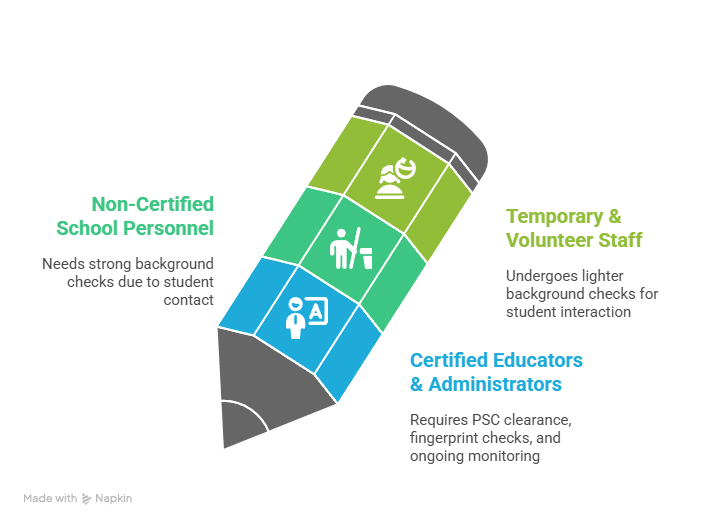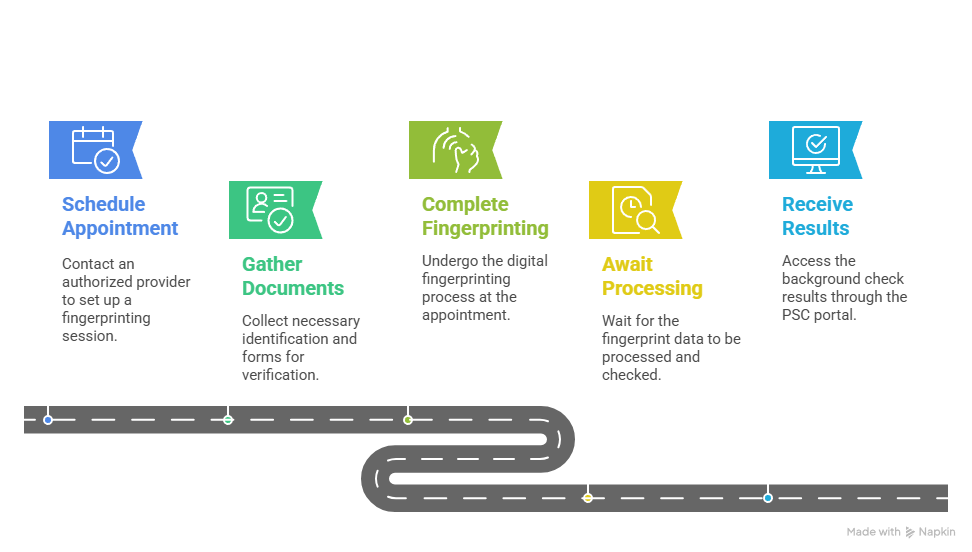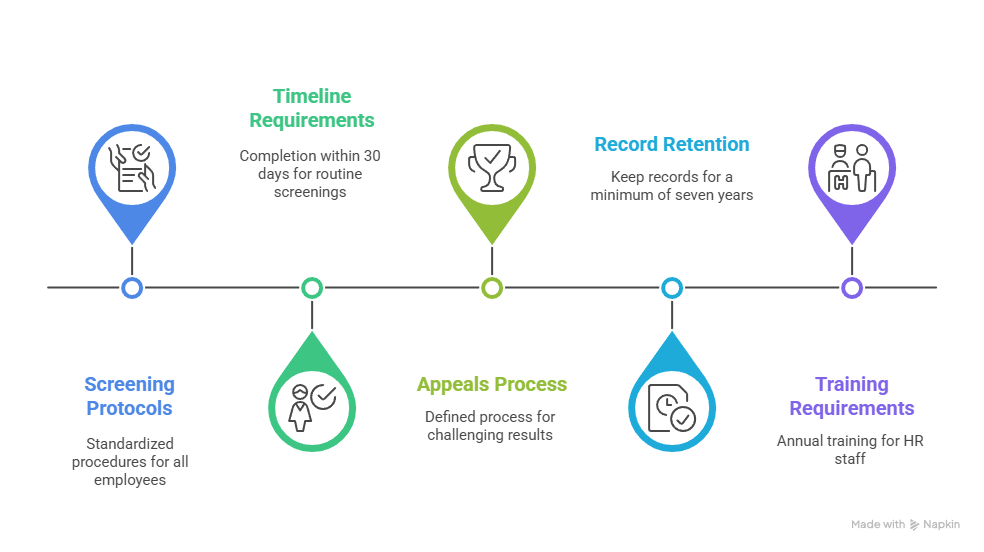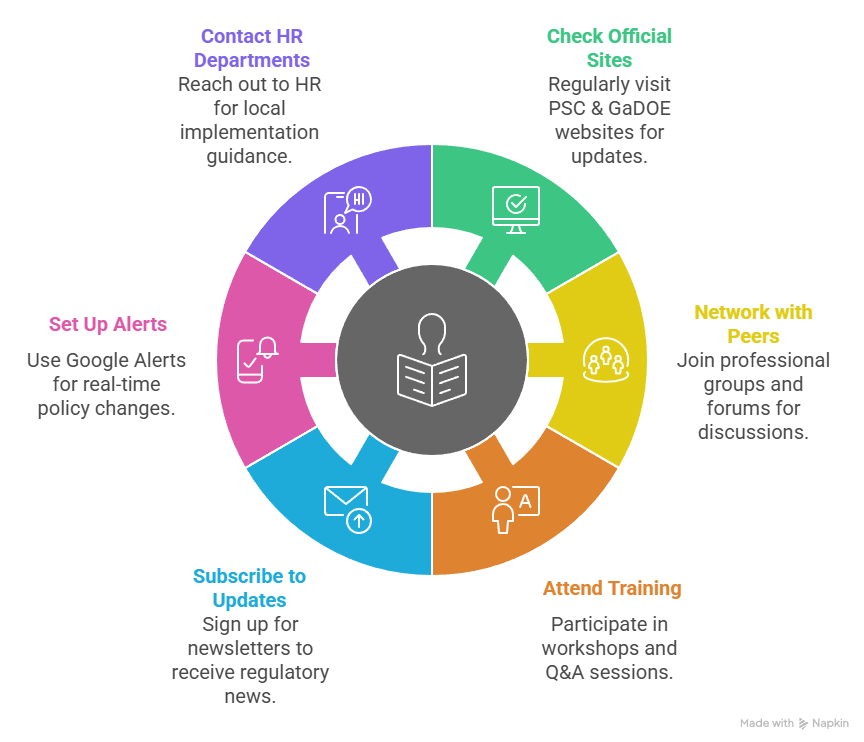Georgia education background checks are mandatory for all K-12 employees and require compliance with both the Professional Standards Commission (PSC) and Georgia Department of Education (GaDOE) regulations. These comprehensive screenings protect students while ensuring qualified professionals can navigate the employment process efficiently.
Key Takeaways
- Georgia mandates background checks for all K-12 education professionals, ensuring student safety by complying with PSC and GaDOE regulations.
- The background check process includes fingerprinting and must be completed with an authorized provider, taking about 5-15 business days.
- Certified educators must renew their background checks every five years, while non-certified staff also undergo relevant screenings (ChildCare.gov, n.d.; Head Start, 2023).
- Proactive documentation completion and understanding specific role requirements can prevent delays and streamline the hiring process.
- Staying informed about regulatory changes helps maintain compliance and improves your chances of successful employment in Georgia's schools.
Introduction
Georgia's educational institutions maintain some of the nation's most rigorous background screening requirements, reflecting the state's commitment to student safety and educational excellence. Whether you're a teacher, administrator, support staff member, or work for a staffing agency placing education professionals, understanding the specific requirements for Georgia education background checks is essential for successful employment in the state's K-12 system.
As a professional working in the area of Human Resources, I see up close that student background screenings at schools are more than a formality; they are a promise we make to students and parents. If the process seems complete, even with regard to fingerprinting and compliance regulations, it reflects a principle beyond procedure: a reciprocal responsibility that every adult that a child encounters at school be safe, qualified, and trustworthy. ItâÂÂs a quiet but powerful way we uphold the kind of learning environment every child deserves.
Understanding Georgia's K-12 Background Check Framework

Navigating Georgia's K-12 background check requirements demands an understanding of its dual oversight structure. The Professional Standards Commission (PSC) and the Georgia Department of Education (GaDOE) jointly ensure all personnel working in the education sector meet strict screening standards.
The Dual Authority System
GeorgiaâÂÂs approach involves two distinct regulators. The PSC manages educator certifications and is responsible for issuing clearance certificates. This involves checking applicants' criminal history and professional conduct, ensuring educators meet the necessary standards. Meanwhile, the GaDOE sets policies guiding how school districts implement these screenings.
| Regulatory Bodies | Function and Coverage |
|---|---|
| In Georgia, two main agencies govern K-12 education: the Professional Standards Commission (PSC) and the Georgia Department of Education (GaDOE). The PSC handles certification, checking criminal history and professional conduct to approve who gets to teach. The GaDOE enforces safety policies and ensures compliance across school districts, from teachers to volunteers. | The PSC ensures individuals are fit to teach or lead, investigating past criminal or ethical issues. The GaDOE implements statewide safety procedures, making sure all school personnel and volunteers meet consistent standards. This dual-system ensures comprehensive oversight and uniform vetting across Georgia schools. |
Employee Categories and Screening Requirements

When it comes to background checks for Georgia's K-12 school employees, different rules apply depending on the type of position. Understanding these distinctions can guide you through the process more efficiently.
- Certified Educators and Administrators: For certified educators and administrators, a PSC clearance certificate is mandatory before you can start. This involves fingerprint-based background checks conducted by authorized providers. It's not a one-time thing; ongoing monitoring is part of the deal to catch any new criminal activity. Every five years, you'll need to undergo a renewal screening. If you're arrested, the clock starts tickingâÂÂyou have 30 days to report it.
- Non-Certified School Personnel: This category includes substitute teachers, paraprofessionals, food service workers, and maintenance staff, among others. While they don't need a PSC clearance certificate, these roles still demand robust screening procedures. Regular contact with students brings extra scrutiny.
- Temporary and Volunteer Staff: Not everyone interacting with tudents needs the full screening experience. Short-term volunteers for events like field trips, guest speakers, or student teachers fall under this group. Though these roles are crucial for school operations, the background check requirements are typically less intense than for those with ongoing responsibilities.
What type of employee are you, and what does that mean for your background check requirements? Identifying where you fit can make the process more straightforward. This clarity helps you meet Georgia's stringent educational employment standards with confidence.
PSC Fingerprint Requirements and Procedures
Fingerprint-based background checks are a crucial component of the hiring process for education professionals in Georgia. They ensure that those working with children meet stringent safety standards. As an employment background check expert, I can tell you firsthand how vital this process is for protecting students and maintaining trust within the educational community.
Every educator or school employee must go through fingerprinting, as mandated by the Georgia Professional Standards Commission (PSC). This step is non-negotiable, providing a detailed record that encompasses both state and federal criminal history.
Fingerprint Background Check Process
The Georgia Professional Standards Commission requires all education personnel to complete fingerprint-based background checks through authorized providers. This process examines both state and federal criminal history records, ensuring comprehensive screening for potential red flags.

Schedule Appointment: First, connect with an authorized fingerprinting provider. These providers are approved by the PSC and offer the necessary resources to capture and submit your fingerprints accurately.
Gather Required Documents: Bring with you a valid government-issued ID and any forms suggested by the PSC. These documents are necessary to verify your identity and link you correctly to your background check results.
Complete Fingerprinting: At your appointment, digital fingerprints will be taken. This process is quick, typically lasting just a few minutes. Be prepared to pay any required fees at this stage; they can vary depending on the service provider.
Await Processing: It usually takes 3-5 business days for your fingerprints to be processed. During this time, your data is checked against criminal databases to spot any concerning records.
Receive Results: Results are accessible via the PSC online portal. This streamlined system saves time and provides the necessary information at your convenience.
This structured approach ensures that every school district upholds the safety standards expected by parents and the community. Your cooperation plays a direct part in this security framework.
Criminal History Evaluation Standards
The PSC doesn't just pull a criminal history report and file it away. Each report is thoroughly evaluated. Decision-makers will consider the type and severity of offenses, rehabilitative efforts made by the applicant, and how much time has passed since the incident. Their goal is not only to protect students but also to assess if you're fit for a role in education. This balanced approach defines the integrity of Georgia's hiring practices.
Understanding these procedures equips you to better manage your path in GeorgiaâÂÂs education system. Fingerprinting isn't just a formalityâÂÂit's a foundational step that underscores a commitment to safety and excellence in K-12 education.
GaDOE Policy Requirements and Compliance
District-Level Implementation Standards

The Georgia Department of Education sets the guidelines that school districts must follow during employee background checks. Every district must apply these guidelines uniformly, yet they have some leeway in how they implement them, as long as they adhere to certain standards.
- Screening Protocols: Districts must outline standardized procedures that apply to all categories of employees. Every protocol should be systematically documented and receive school board approval.
- Timeline Requirements: For routine screenings, districts are bound to complete the process within a maximum of 30 days, ensuring timely hiring decisions.
- Appeals Process: There must be a defined process for employees to challenge the results of their background checks, which includes protections ensuring a fair evaluation.
- Record Retention: Districts are required to keep background check records for a minimum of seven years to maintain accountability and for future reference.
- Training Requirements: Human Resources staff must undergo annual training to stay up-to-date on screening procedures and compliance standards.
Ongoing Monitoring and Compliance
Georgia school districts implement continuous monitoring systems to ensure all employees remain qualified and compliant with background check standards after hire. This process is vital for maintaining a secure environment for students.
Districts typically utilize automated alerts and frequent data reviews for ongoing checks. This involves continuous access to criminal records databases to identify any new issues that could impact an employee's eligibility to work within the school system. For instance, the system may flag new arrest records for further evaluation.
Monitoring does not stop with criminal activity. It extends to professional conduct. Any complaints or issues reported during employment are assessed promptly, ensuring that problems are addressed before they impact the school's operation.
These practices provide consistency. Yet, they also allow flexibility where due process is necessary. Employees have the right to respond to findings, ensuring fair treatment. Districts must adhere to set policies to manage how information is handled and how decisions are made.
This ongoing oversight aims to prevent risks before they escalate. It acts as a safeguard for schools and a reassurance for parents that their children learn in a secure, responsible environment. Are your district's monitoring practices efficient enough to handle these responsibilities?
Staffing Agency Compliance Requirements
Staffing agencies play a crucial role in placing education professionals in Georgia schools. As an intermediary, your agency must comply with strict background check regulations to ensure all placed workers meet state requirements.
| Category | Key Details |
|---|---|
| Agency Compliance Obligations | Ensure every education professional has a valid PSC clearance certificate before starting. Verify fingerprint-based checks and monitor for new criminal activity. Keep detailed verification records for audits. |
| Documentation and Record-Keeping | Maintain complete records: fingerprint results, clearance certificates, and related correspondence. Strong documentation supports compliance and audit readiness. |
| Coordination with School Districts | Communicate with districts to confirm specific background check requirements. Some may have extra policies. Clear coordination helps avoid delays and ensures full compliance. |
By staying well-informed of Georgia's background check processes and maintaining diligent record-keeping, your agency will efficiently navigate regulatory landscapes, supporting both school districts and job seekers in achieving a safe and compliant educational environment.
Timeline and Processing Expectations
Timing is everything when it comes to background checks in the education sector. For Georgia's K-12 employment, a clear understanding of timelines can make all the difference in successful hiring.
On average, standard fingerprint-based background checks take about 5-15 business days. This range covers the entire process from scheduling your appointment with an authorized provider to receiving your final results. But what happens when things take longer?
Factors like incomplete paperwork, mismatches in identification, or a high volume of requests can extend processing times. It's not uncommon for certain checks to stretch beyond the 15-day mark. Are you ready for this possibility?
Planning ahead mitigates these potential delays. Start by gathering all necessary documents early in the process. Double-check your information for accuracy before submission. These small steps can be the difference between a smooth hiring experience and a frustrating wait.
As an employer, maintaining open communication with potential employees about estimated timelines can prevent misunderstandings. Clearly outline your expected processing period and provide regular updates. This transparency not only aids in planning but also strengthens trust.
For those navigating the hiring process in Georgia's education system, early and organized action can streamline your experience. Planning with flexible timelines accommodates both standard and unforeseen processing delays, ensuring your hiring needs are met without unnecessary setbacks.
Successfully navigating Georgia's K-12 background check process requires proactive planning and realistic timeline expectations. By gathering documents early, maintaining clear communication, and building flexibility into your hiring schedule, you can minimize delays and avoid last-minute complications. Remember that while standard processing takes 5-15 business days, allowing extra time for potential delays ensures a smoother hiring experience for both employers and candidates.
Addressing Background Check Issues

Background checks sometimes reveal small issues that can delay your hiring process. It's helpful to be aware of common challenges and how to address them.
Name Discrepancies: Typos or name variations can create mismatches with records. Make sure your application documents use a consistent legal name, and check that it's the same on your identification and official records. If a discrepancy arises, be prepared to provide documentation that supports your identity.
Address History Gaps: Missing or incomplete address history can cause confusion. Ensure that you provide a complete list of past addresses, especially if you've moved frequently in and out of state. If there are gaps, explain them in your documentation to avoid missteps.
Arrest vs. Conviction Confusion: Understand that an arrest record is not the same as a conviction. When background checks pull up arrest records, be ready to clarify any misunderstandings by providing court documents or legal evidence indicating case conclusions or resolutions.
Out-of-State Record Delays: Records from other states may take longer to process due to differences in state protocols. If you have lived or worked outside Georgia, anticipate these delays and communicate your history clearly at the start. You can contact previous states' authorities to facilitate swifter verification.
When faced with these challenges, remember being proactive is key. Keep copies of all relevant documentation, stay organized, and maintain open communication with potential employers. If inaccuracies arise, address them directly with the reporting agency or your prospective employer without delay. How prepared are you to handle these potential hiccups in your employment journey?
Appeals and Dispute Resolution
You might face an unexpected hiccup when your background check returns unexpected results. When this happens, knowing how to appeal can make all the difference. Start by carefully reviewing the findings. What are the discrepancies? Sometimes, it merely takes clarifying outdated or incorrect data.
Gather documentation that supports your case. This might include court records, letters of explanation, or proof of identity. Each piece helps to build a clearer picture of your past.
File a formal appeal directly with the responsible agency or employer. Keep copies of everything you submit, and ensure your appeal clearly states the areas of dispute and the evidence that supports your contention.
Be prepared to participate in the review process. This might include interviews or additional questioning. ItâÂÂs an opportunity to present your side directly. Approach it with clarity and honesty.
Finally, await the decision. The review might take time, and patience will be necessary. Stay proactive by checking for updates if timelines exceed expectations.
Cost Considerations and Financial Planning
Understanding the cost structure of Georgia's education background checks is crucial for both job seekers and employers. These fees can add up, so it's important to plan your budget accordingly.
Typically, the cost for fingerprint-based background checks ranges from $50 to $80. This price includes processing fees associated with both state and federal criminal history records. If you're covering these fees yourself, make sure to check whether they are non-refundable, as some providers retain funds even if results are unfavorable.
For employers, the cost is often considered an investment in hiring reliable staff and ensuring the safety of students. Some districts might cover these costs as part of their onboarding process. If you're uncertain about who pays, ask during the hiring process to avoid budget surprises.
When choosing a fingerprinting provider, examine their fee structures. Some offer bundled services at a discount, which could be beneficial if other checks are needed. Payment options vary, but most accept credit cards, and a few offer billing arrangements for organizations.
In summary, while navigating the financial aspects of Georgia's education background checks, ensure you account for fees and confirm who is responsible for payment. This clarity assists in efficient financial planning and reduces stress during the hiring journey.
Online Portal Systems
Georgia's education background checks have shifted towards digital systems for increased efficiency. The PSC's online portal allows you to track your fingerprinting and background check status. This means less waiting and more transparency. Once your fingerprints are submitted, you can access your results online, typically within a week.
Digital portals also help reduce paperwork. You upload documents directly to the system, saving time. It's faster than mailing and ensures accurate record-keeping. Familiarize yourself with the portal early in the process to leverage its features fully.
Are there challenges? Sometimes. Technical glitches occur, and interfaces can differ between systems. Prepare by keeping a checklist of required documents and deadlines. This helps if you need to contact tech support or follow up on submissions.
Using these portals effectively can streamline your background check experience. It moves you closer to getting classroom-ready, ensuring your focus is on teaching, not paperwork.
Best Practices

Keeping up-to-date with Georgia's education background check requirements is vital for education professionals. Changes in regulations can affect your certification and employment eligibility. Here are some practical steps you can take:
Visit Official Websites Regularly: Make it a habit to check the Professional Standards Commission (PSC) and Georgia Department of Education (GaDOE) websites. They regularly update policies and requirements.
Join Professional Networks: Engage with peers through professional organizations or online forums related to education in Georgia. Networking can provide insights into recent changes and firsthand experiences from fellow educators.
Attend Workshops and Training: Participate in professional development workshops focused on compliance and background check processes. These sessions often highlight recent updates and provide direct Q&A opportunities with experts.
Subscribe to Newsletters: Both the PSC and GaDOE may offer newsletters or bulletins. These can deliver the latest regulatory updates straight to your inbox, saving you time in searching for information.
Set Alerts for Policy Changes: Use tools like Google Alerts to notify you of any news or changes related to Georgia's education background checks. This hands-free approach ensures you receive real-time information.
Communicate with School Districts: If you're employed or seeking employment with a district, reach out to HR departments. They can offer clarity on how new policies are implemented locally and provide guidance specific to your role.
Proactive engagement with these requirements also benefits job seekers. Completing processes promptly reduces the likelihood of delays in starting your position. Navigating these rules efficiently can make you a more attractive candidate, demonstrating reliability and commitment to safeguarding student welfare. For those involved in staffing, understanding these details ensures you fulfill legal obligations and enhance the credibility of your services.
Conclusion
As you consider employment within Georgia's educational system, ask yourself: Are you prepared to meet these standards, and how will you ensure compliance throughout your career? The answers can shape not only your job eligibility but also your professional journey within the state's schools.
Georgia's education background checks are rigorous to maintain safe and educated environments. Preparing thoroughly, understanding your rights, and managing timelines are critical to successfully navigating this process. By following this guide, you'll be well-prepared for compliance with Georgia's K-12 screening requirements.
Frequently Asked Questions
Knowing the procedure of background screenings conducted in Georgia, more so in the field of learning, is critical for hiring officials and applicants. For those wishing to be teachers or are already going through the hiring procedure, these frequently asked questions will help explain what to expect and prepare for sufficiently.
What does a Georgia background check show?
A Georgia background check typically reveals criminal records, credit reports, employment history, educational credentials, and driving records. It may also include sex offender registries and past civil cases.
Does Georgia follow the 7-year rule background check?
Yes, Georgia adheres to the 7-year rule for background checks, meaning that certain records, such as civil judgments and arrests, may not be reported after seven years.
Does Georgia do background checks?
Yes, background checks are conducted in Georgia for various purposes, including employment and housing. Both private companies and government agencies perform these checks.
What is the background check for teachers in Georgia?
Teachers in Georgia undergo a comprehensive background check, which includes fingerprinting and a review of criminal records to ensure the safety of students.
What do they find out on a background check?
A background check can reveal criminal history, credit reports, employment verification, educational background, and driving records. The specifics depend on the purpose of the check.
What is a Level 2 background check in Georgia?
A Level 2 background check in Georgia includes fingerprint-based searches of national criminal databases. It is typically required for positions involving care of children or vulnerable adults.
How long does a background check take in Georgia?
Background checks in Georgia generally take from a few days to a week. However, the length can vary depending on the depth of the investigation and the specific checks required.
Can you dispute findings in a background check in Georgia?
Yes, if you find inaccuracies in your background check, you have the right to dispute the errors with the reporting agency and have them corrected.
Are employers in Georgia required to notify you before conducting a background check?
Yes, employers must obtain your written consent before carrying out a background check. They are also required to inform you if the results influence their hiring decision.
What is included in a fingerprint background check in Georgia?
A fingerprint background check in Georgia provides a detailed report from state and federal criminal history databases, giving a comprehensive view of any past illegal activities.
Additional Resources
- Teacher Background Checks: What You Need to Know
https://checkr.com/resources/articles/teacher-background-checks - How to Become a Teacher in Georgia
https://www.teachersoftomorrow.org/blog/insights/how-to-become-a-teacher-in-georgia/ - Teaching Background Check: What Shows Up and What to Expect
https://iprospectcheck.com/teaching-background-check/ - Guide to Teacher Certification in Georgia
https://www.alleducationschools.com/teacher-certification/georgia/
References
ChildCare.gov. (n.d.). Staff background checks in regulated child care. U.S. Department of Health & Human Services. https://childcare.gov/consumer-education/regulated-child-care/staff-background-checks
Head Start. (2023). Background checks FAQs. https://eclkc.ohs.acf.hhs.gov/human-resources/article/background-checks-faqs

GCheck Editorial Team
Meet the GCheck Editorial Team, your trusted source for insightful and up-to-date information in the world of employment background checks. Committed to delivering the latest trends, best practices, and industry insights, our team is dedicated to keeping you informed.
With a passion for ensuring accuracy, compliance, and efficiency in background screening, we are your go-to experts in the field. Stay tuned for our comprehensive articles, guides, and analysis, designed to empower businesses and individuals with the knowledge they need to make informed decisions.
At GCheck, we're here to guide you through the complexities of background checks, every step of the way.






